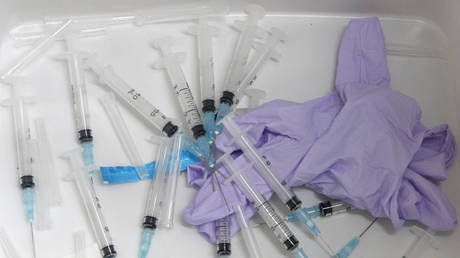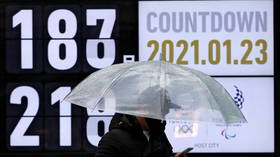
Japan’s vaccination drive has hit a snag after it was discovered that the country lacks proper syringes to extract the maximum number of doses from each vial. The hiccup could result in millions of people being denied the drug.
The Asian nation reserved 144 million shots of the Pfizer/BioNTech vaccine, enough to give 72 million people the full two-dose regimen. The plan relied upon the assumption that each bottle of the drug would provide six shots. However, Japan lacks a special kind of needle, known as a low dead space syringe, which minimizes the amount of leftover vaccine after each injection. As a result, the assumption that each vial would give six shots was too optimistic, with officials now saying that without such syringes, only five doses can be extracted from a bottle.
The issue could result in as many as 12 million people being denied the drug, according to estimates cited by the media.
Health Minister Norihisa Tamura said that all available syringes that are capable of extracting six doses will be used, but that a shortage will be inevitable as more shots are administered. The government has confirmed that bottles containing the sixth dose will likely have to be discarded if healthcare workers are unable to properly use them. Medical equipment manufacturers in the country have been asked by authorities to ramp up production of the six-dose syringes in an attempt to mitigate the damage.
The syringe problem has exacerbated the confusion and disarray surrounding Japan’s vaccine rollout. The Pfizer drug has not yet been approved for emergency use, even as officials say they hope to begin the vaccine drive next week. Between 10,000 to 20,000 frontline health workers will be the first to receive the shot, followed by an additional 3.7 million healthcare professionals starting in mid-March. Elderly citizens at high risk of contracting the virus will be eligible to receive the drug beginning in April.
The rollout has been criticized for lagging behind the public health programs of other developed nations, but Japan has insisted that it is acting out of an abundance of caution. With Tokyo set to host the Olympic games this summer, the Japanese government has also struggled to convince its population, and the world, that the sporting event will be safe. A poll back in January found that 70 percent of its Japanese participants wanted the Olympics to be postponed or cancelled due to concerns about the pandemic.
Like this story? Share it with a friend!
Related posts:
Views: 0
 RSS Feed
RSS Feed

















 February 10th, 2021
February 10th, 2021  Awake Goy
Awake Goy 
 Posted in
Posted in  Tags:
Tags: 
















